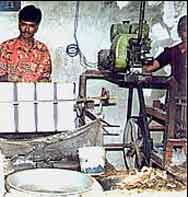
The Tide Turns
An Indian alternative energy company has been crowned energy champion of the world by a British environmental organisation for its ultra-efficient wood burning stove which will reduce fuel use by 30 per cent.
Bangalore-based Technology Informatics Design Endeavour (Tide) was awarded the title along with a prize of 40,000 pounds by Nobel laureate and environmentalist Wangari Mathai at a ceremony in London.
Another Indian group, the Aryavart Gramin Bank, was among six other international bodies whose schemes were awarded 20,000 pounds each Thursday night by the Britain-based Ashden Awards for Sustainable Energy – the so-called Green Oscars.
Many of southern India’s small businesses rely on wood as their main source of fuel, causing pollution, deforestation and uncomfortable and dangerous working conditions when boilers and stoves are badly designed.
Building on the track record of stove design at the Indian Institute of Science, Tide commercialises their designs to provide efficient, bespoke woodstoves and kilns which save at least 30 percent fuel.
To date 110,000 workers enjoy better conditions thanks to the 10,000 products Tide has supplied, saving around 43,000 tonnes of wood each year.
Tide is developing a range of stoves for large-scale cooking, and working with larger production centres in order to bring the stoves to more customers.
Svati Bhogle of Tide said the group was encouraged by the award to “venture into uncharted terrain, to first break new ground and then develop it into a beaten track”.
“There is a serious energy crisis in rural India, but access to energy and its efficient use, accompanied by well-conceived and well-implemented enabling mechanisms, has the potential to transform rural areas,” Bhogle added.
The international winners were: Cooperativa Regional de Eletrificação Rural do Alto Uruguai Ltda (Brazil); Renewable Energy Development Project (China); Gaia Association (Ethiopia); Aryavart Gramin Bank (India); Kisangani Smith Group (Tanzania) and Fruits of the Nile (Uganda).
The Aryavart Gramin Bank in Uttar Pradesh used solar photovoltaic (PV) systems to back-up the unreliable grid power for some of its branches, and recognised the potential of PV for its many off-grid customers.
The bank set up a bulk supply and installation agreement with TATA-BP for PV solar-home-systems, and provides loans to its customers with a good credit record to purchase the systems. To date 20,000 loans have been approved and 10,000 solar-home-systems installed.